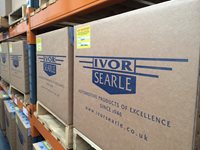 Ivor Searle began life back in 1946. The world of remanufacturing has changed significantly in the past 70 years but the Cambridgeshire based company continues to be a trailblazer in the market for remanufactured engines, cylinder heads, gearboxes and turbos.
Ivor Searle began life back in 1946. The world of remanufacturing has changed significantly in the past 70 years but the Cambridgeshire based company continues to be a trailblazer in the market for remanufactured engines, cylinder heads, gearboxes and turbos.
In 1943, ‘Make Do and Mend’ was a pamphlet issued by the British Ministry of Information, aimed at giving housewives practical tips on how to be frugal during times of rationing. Although driven by pressures on society as a result of war and lack of supply, in a sense, this initiative was a forerunner to the concept of remanufacturing in the UK, as Ivor Searle started life the year after the Second World War ended.
Fast forward 70 years and Governments around the developed world are being urged to embrace what’s called the ‘Circular Economy’, as part of a global bid to control the rate at which we consume resources and pollute the environment. The concept champions a range of activities including reuse, sharing, pay-per-use, repair, refurbishment, remanufacturing and recycling of products, in order to preserve natural resources, minimise energy consumption and avoid landfilling. At the same time, economic benefits such as job creation from innovation and process allow an economy to grow and prosper without increasing environmental degradation.
Remanufacturing is a fundamental part of a Circular Economy, as it’s a cost effective alternative to manufacturing brand new products, whilst also saving on raw materials and energy. Typically, a remanufactured engine from Ivor Searle will save 55kg in core metal. Multiply that by the number of new engines being manufactured across the world and the amount of weight involved is almost planetary. Not only that, on average, 85% of original components will be brought back to OEM specification or better, during Ivor Searle’s stringent engine remanufacturing process.
It’s also important to note that engine remanufacturing requires substantially less energy. In fact, the process typically uses 85 per cent less energy than manufacturing and at the other end of the cycle, reduces the quantity of landfill and associated energy needed for disposal.
The UK is one of the four leading remanufacturing countries in Europe, alongside Germany, France and Italy. According to a report published this year by The European Remanufacturing Network (ERN), the remanufacturing sector could triple in size within Europe and be worth €90bn by 2030. At present, it represents around 2% of the size of the new manufacturing market.
With the legal requirement that all EU manufactured cars are now 95% recyclable, it’s clear that the automotive sector is a trailblazer for sustainability in its widest sense but seeking greater volumes of new product is in itself, unsustainable, as technology improves.
Speaking of technology, it’s not just in the remanufacturing process where Ivor Searle leads the field. The ability for customers to search and order parts has taken a massive step forward in 2016 with the launch of Ivor Searle’s new website, featuring a pioneering ECAT system. A first in the world of remanufacturing, customers can simply search for engine, gearbox, cylinder head and turbo stock by entering a vehicle registration or VRN. If available, it can be ordered online and if done so by 3.30pm, it will be delivered next day in the UK.
Filed under: auto remanufacturing, gearbox reman, reman cylinder heads, reman engines, reman gearboxes